The Importance of the First Amendment to Democracy

Introduction
The First Amendment of the United States Constitution is a fundamental element of American democracy, safeguarding essential rights that form the foundation of a free society. Ratified in 1791, it guarantees freedoms concerning religion, expression, assembly, and the right to petition the government. As civic discourse evolves, understanding and protecting these freedoms remains more pertinent than ever, especially in light of recent events that test their boundaries and implications.
The Core Elements of the First Amendment
The First Amendment consists of five key freedoms: freedom of religion, speech, press, assembly, and petition. Freedom of speech allows individuals to express their thoughts and opinions without government interference, fostering a marketplace of ideas essential for democracy. Freedom of the press provides journalists with the independence to investigate and report on issues affecting the public, which is crucial for a well-informed citizenry.
The right to assemble allows groups to gather peacefully for demonstrations and protests, a practice deeply rooted in American history. Finally, the right to petition empowers citizens to address grievances and seek changes from their government, reinforcing the notion that democracy is a participatory process.
Recent Challenges to First Amendment Freedoms
In recent years, challenges to First Amendment rights have become increasingly prominent. High-profile cases surrounding hate speech, social media content moderation, and governmental censorship have sparked significant legal debates and public discourse. For example, the rise of misinformation and hate speech on social media platforms has led to concerns about the balance between free expression and public safety.
Moreover, the COVID-19 pandemic prompted discussions about the limits of assembly and speech in times of public health emergencies. Legal scholars and civil rights advocates closely monitor these developments to ensure that individual freedoms are not unduly compromised in the name of security or popular sentiment.
Conclusion
The First Amendment remains a powerful protector of individual liberties and is integral to the democratic process in the United States. As society navigates complex issues related to free expression, it is crucial for citizens to remain vigilant in protecting these rights. Understanding the First Amendment is not just an academic exercise; it is a call to action for all to preserve the freedoms that underpin American democracy, enabling a robust exchange of ideas essential for progress. As public dialogues continue to evolve, the significance of the First Amendment will endure, cementing its place at the heart of American identity.









